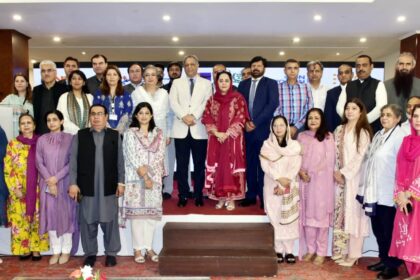The inaugural ceremony for the COMSTECH–PCMD international training course in virology and pandemic preparedness took place at the International Center for Chemical and Biological Sciences, University of Karachi, drawing faculty members, vice chancellors, researchers, officials and heads of scientific organisations from Pakistan and OIC member states.
The programme began with the national anthem and a recitation from the Holy Quran before Prof. Dr. M. Raza Shah, Director ICCBS and UNESCO Chair on Bioorganic and Natural Products Chemistry, delivered a welcome address highlighting the centre’s continuing role in fostering research and innovation across the Islamic world.
H.E. Prof. Dr. M. Iqbal Choudhary, Coordinator General of OIC-COMSTECH, delivered the keynote and underlined the urgent need to strengthen scientific and diagnostic capacities in OIC countries. He observed that the COVID-19 pandemic exposed gaps in cross-border collaboration, rapid response systems and technology transfer, and he outlined COMSTECH’s strategic programmes to promote laboratory alliances, sustained training courses and technology foresight to build regional resilience.
Dr. Choudhary reaffirmed COMSTECH’s commitment to empower young researchers and advance molecular diagnostics while creating a sustainable framework for scientific cooperation. He stressed that through joint research and shared knowledge OIC nations can collectively enhance preparedness and response capabilities in health and science.
Speakers including Ms. Nadira Panjwani, Chairperson of the Dr. Panjwani Memorial Trust, Prof. Dr. Nazli Hossain, Vice Chancellor of Dow University of Health Sciences, and Mr. Jamshaid Alam Memon, Special Secretary for Health, Government of Sindh, welcomed the launch of COMSTECH–PCMD as a landmark initiative for research excellence, training and innovation in virology and pandemic preparedness.
The joint effort by OIC-COMSTECH and the Panjwani Center for Molecular Medicine and Drug Research at ICCBS positions Pakistan as an active hub for capacity building in the region, with the virology training expected to strengthen diagnostic networks and prepare a new generation of scientists for future public health challenges.











